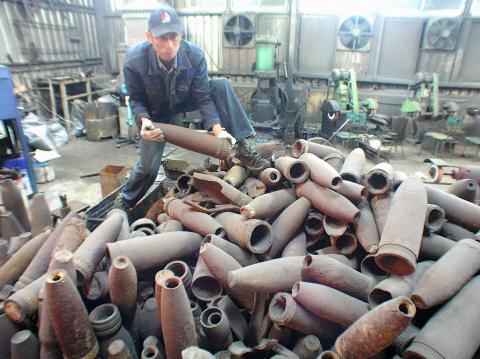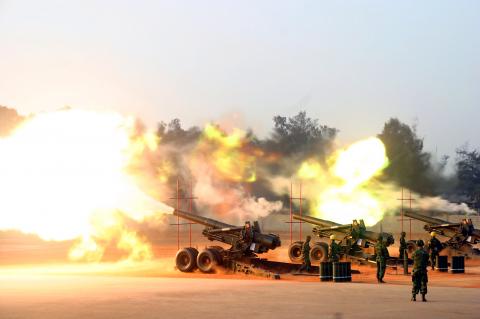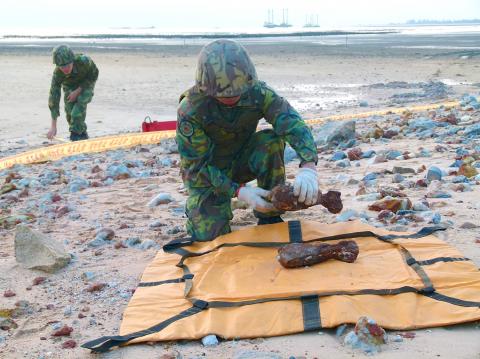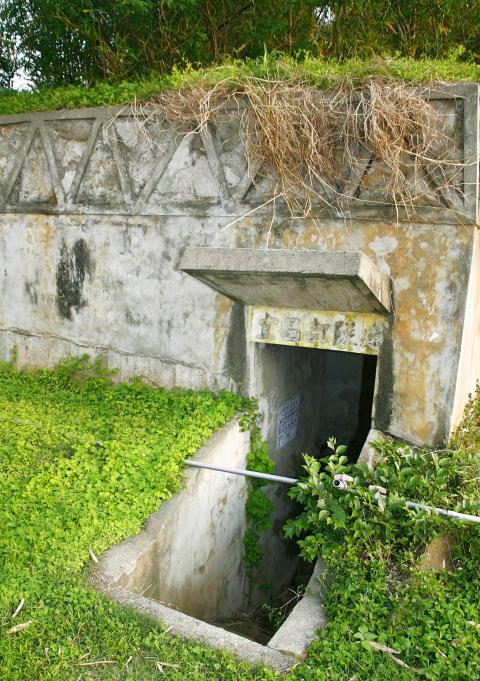Aug. 28 to Sept. 3
Wu Su-hsia’s (吳素霞) elder sister was born in a blast shelter on Taiwan’s outlying island of Kinmen.
“She would tell people that the shelter was just like a living room for the people of Kinmen,” Wu writes in her book Jinshengjinshi (金生金世), a collection of essays about her home island.

Photo: Wu Cheng-Ting, Taipei Times
“Whenever it got dark, the men returned from the fields and the women would call for the children to come home. The old people who walked slower would already be in the shelter, waiting for the sound of artillery fire.”
Life carried on as usual. Under the glow of kerosene lamps, the men discussed the harvest and the women talked about the children while shelling peanuts for planting. Wu worked on her homework for the next day.
“In the tiny shelter, we could only leave our fate to the heavens. We promised each other that no matter how tough things got, we would live on,” she said.

Photo: CNA
TWENTY YEARS OF SHELLING
The 823 Artillery Bombardment (八 二 三炮戰), which reached is climax on Sept. 3, 1958, officially ended on Oct. 5, but the People’s Liberation Army continued with the bombardment on odd-numbered days. It’s estimated that by the time the shelling stopped in 1979, more than 970,000 shells had landed in Kinmen.
The shelling would intensify at times, but the pattern was generally the same and residents knew when to take shelter.

Photo: Wu Cheng-ting, Taipei Times
But there were still casualties. Wu recalls a neighbor’s son being struck in the head during a visit back home from university in Taiwan. It was the seven-year-old’s first experience with death.
Lin Yi-chung (林怡種), born in Kinmen three years before the battle, writes in his autobiography that in addition to deaths caused by the shelling, he watched an uncle get shot in the chest during a village-wide military drill.
His family home was hit by seven shells during the 823 bombardment and they mostly subsisted on sweet potato soup. Children would pick up artillery shells to exchange for candy or popsicles, and that’s how famous singer Wang Ying-tan (王英坦), dubbed King of Kinmen (金門王), lost an arm and his eyesight: he and his friends had picked up a live shell on their way home from school.

Photo: CNA
People were not allowed to own any floating objects, such as basketballs, for fear that they would try to swim to China.
Lin says that after the 1949 Battle of Guningtou (古寧頭), the island was turned into a military zone with all men between 18 and 45 years old and unmarried women between 16 and 35 undergoing military training. He started as a 10th grader, volunteering to stand guard for his father to avoid disrupting his work as a farmer.
“The soldiers would shoot random objects in the village for fun while the children watched. On the other side of a pond, the farmers continued to water their vegetables as if nothing was happening,” he writes. “Perhaps since artillery shells were falling around us all the time, we were used to seeing blood and death. We didn’t even flinch if someone was shooting a rifle right next to us.”

Photo courtesy of Lee Chin-hui
RELENTLESS BROADCASTS
Two years before Lin was born, the People’s Liberation Army started broadcasting deafening propaganda toward Kinmen. Unfortunately, Lin’s village faced China and at school, his teachers often had to yell over the propaganda.
“Whether it was day or night, whether we were inside or outside, we could hear every word clearly,” he writes. “The only respite was to stuff cotton in our ears.”
The broadcasts urged the soldiers to “return to the motherland,” promising not only monetary rewards but also their personal safety and job security once in China. They also played folk songs from various Chinese regions for the soldiers stationed on the island and announced major achievements such as the completion of the Nanjing Yangtze River Bridge.
Things only got worse during the Cultural Revolution as the broadcasts intensified. Later on, the communists recruited relatives of high-level Chinese Nationalist Party (KMT) officials as well as Republic of China army defectors — including one who escaped from Kinmen.
The only broadcasts that the people of Kinmen were happy to hear were ones announcing temporary shelling breaks during national holidays such as the Lunar New Year.
When Wu turned nine years old, China established relations with the US and the shelling stopped. Gradually, children turned to playing on top of the shelters and also entering them with torches, pretending to be explorers and treasure hunters.
But the propaganda continued, although in softer and friendlier tones. It wasn’t until 1985 that Lin’s village enjoyed its first moment of quietness in 32 years.
Taiwan in Time, a column about Taiwan’s history that is published every Sunday, spotlights important or interesting events around the nation that have anniversaries this week.

May 18 to May 24 Pastor Yang Hsu’s (楊煦) congregation was shocked upon seeing the land he chose to build his orphanage. It was surrounded by mountains on three sides, and the only way to access it was to cross a river by foot. The soil was poor due to runoff, and large rocks strewn across the plot prevented much from growing. In addition, there was no running water or electricity. But it was all Yang could afford. He and his Indigenous Atayal wife Lin Feng-ying (林鳳英) had already been caring for 24 orphans in their home, and they were in

On May 2, Chinese Nationalist Party (KMT) Chairman Eric Chu (朱立倫), at a meeting in support of Taipei city councilors at party headquarters, compared President William Lai (賴清德) to Hitler. Chu claimed that unlike any other democracy worldwide in history, no other leader was rooting out opposing parties like Lai and the Democratic Progressive Party (DPP). That his statements are wildly inaccurate was not the point. It was a rallying cry, not a history lesson. This was intentional to provoke the international diplomatic community into a response, which was promptly provided. Both the German and Israeli offices issued statements on Facebook

Even by the standards of Ukraine’s International Legion, which comprises volunteers from over 55 countries, Han has an unusual backstory. Born in Taichung, he grew up in Costa Rica — then one of Taiwan’s diplomatic allies — where a relative worked for the embassy. After attending an American international high school in San Jose, Costa Rica’s capital, Han — who prefers to use only his given name for OPSEC (operations security) reasons — moved to the US in his teens. He attended Penn State University before returning to Taiwan to work in the semiconductor industry in Kaohsiung, where he

President William Lai (賴清德) yesterday delivered an address marking the first anniversary of his presidency. In the speech, Lai affirmed Taiwan’s global role in technology, trade and security. He announced economic and national security initiatives, and emphasized democratic values and cross-party cooperation. The following is the full text of his speech: Yesterday, outside of Beida Elementary School in New Taipei City’s Sanxia District (三峽), there was a major traffic accident that, sadly, claimed several lives and resulted in multiple injuries. The Executive Yuan immediately formed a task force, and last night I personally visited the victims in hospital. Central government agencies and the